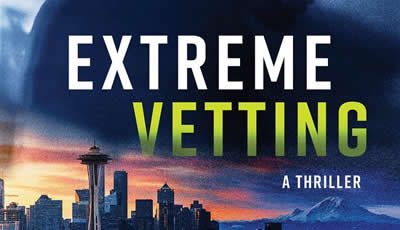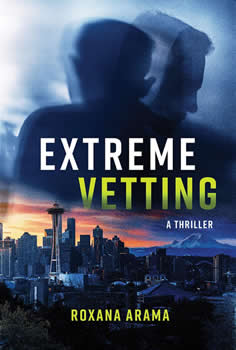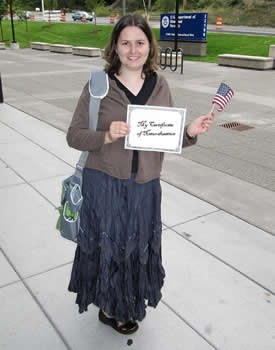

Debut Authors Debut Spotlight: Roxana Arama
Shining a Spotlight on the Dark Corruption of ICE Agents
 By Karen Hugg
By Karen Hugg
February 7th is an important date in Roxana Arama’s life. On that day in 2001, the Romanian-American writer arrived in America, and now her thriller, EXTREME VETTING, will debut 22 years later on the same day. This “nice coincidence,” as she calls it, completes a long journey from first considering the idea of writing as a child in Galați, Romania, to perfecting her craft and sharing its result with the world.
Arama grew up under the oppressive communist regime of Nicolae Ceaușescu, where what students read was controlled by the government. So it wasn’t until she was exposed to a freer American culture that she realized she could just go ahead and write if she chose. “For a long time I thought writing was something only select people were allowed to do. And in a way, that was the case during the communist era,” she says. “But everyone here [in the US] was writing or talking about writing, and it finally dawned on me that I didn’t need permission, that I could just start writing.”
Now, an MFA and many years later, Arama has penned EXTREME VETTING. It’s a page-turner that spotlights the dark corruption of ICE agents while beating with a huge heart of compassion. Attorney Laura Holban, a Romanian immigrant who helps clients gain citizenship in Seattle, encounters a sensitive teen named David whose father, Emilio, has been arrested. Laura struggles to help Emilio fight for asylum while forces unseen thwart her efforts. Ultimately, Laura must outmaneuver a deadly conspiracy involving stolen data and human trafficking while protecting her own right to live freely in the United States. It’s a story with a message but told in an entertaining way.
The Big Thrill talked to Arama about the US immigration system, the struggles of the undocumented, how parenting influenced the book, and how to write a novel from four points of view.
What sparked the idea for EXTREME VETTING?
In October 2018, I had a conversation with my husband about me being an immigrant in the US. Some months before, I had watched the president of the United States speak at a rally, where he compared immigrants to venomous snakes that should be crushed underfoot, not given shelter. The crowd loved it, but I was horrified. Dehumanizing the other is always the first step toward violence. So when my husband suggested I write a novel about what it feels like to be an immigrant, I started envisioning the story immediately.
Seattle, despite having a reputation for being a progressive, educated city, has its flaws. Can you share with us the true events behind the book?
In 2018, the ICE chief counsel in Seattle was sentenced to prison for stealing the identities of undocumented immigrants to open bank accounts and credit cards in the victims’ names. A couple of years earlier, another ICE trial attorney was sentenced to prison for falsifying government documents and forging an immigrant’s signature to hasten his deportation. In EXTREME VETTING, an ICE prosecutor trades the personal information of undocumented immigrants for intel that helps him forward his career. Because of him, the deported immigrants are easy to find by those they fled from, who can now finish the job they started years ago.
EXTREME VETTING features a diverse cast of immigrants, and at its heart is a Romanian American lawyer. How did you form the character of Laura?
I started by interviewing an immigration lawyer, who also answered my follow-up questions while I wrote and edited the manuscript. Then I envisioned a protagonist to carry a plot that’s almost too much for her to bear: a dedicated lawyer, a single mom, an immigrant. Laura Holban is a fictional character, but I referenced my experience as an immigrant to build her backstory.
We first meet Emilio and David in a touching scene where he’s helping his son drive to school. That theme of parental love dovetails well, and more than once, into the plot. How does being a parent yourself affect your stories?
I couldn’t have written this novel before I was a parent. I needed the caregiver’s perspective to understand healthy relationships between parents and children and the tragedy that follows when families are torn apart by unfair immigration laws. Laura regrets that she couldn’t help her dying father in Romania. Emilio wants to protect his American sons after his family was murdered many years ago in Guatemala. Mason, the ICE prosecutor, is a better father than his dad. Laura’s mom hates that her daughter lives half a planet away. For all these characters, I drew from my being both a daughter and a parent.
There’s some of John Grisham’s The Client in EXTREME VETTING. Do you see similarities between Laura and Reggie Love and David and Mark Sway?
Laura is resourceful and resilient like Reggie and also has regrets about her family. David and Mark both break rules if they need to. But a big difference is that Laura and David can’t always rely on the usual societal structures. They can’t call 911 because that puts the undocumented immigrants in their lives in imminent danger of arrest and deportation. Emilio is arrested at David’s high school, a supposedly safe place for their family. When Emilio’s younger son needs medical attention, a call to the hospital could help the prosecution argue that his mom isn’t fit to be a parent. Instead of working with the legal system against the bad guys, Laura and David fight mostly on their own.
This book features multiple, alternating viewpoints. What inspired you to use multiple POVs? Was there extra research involved?
Thrillers are a natural format for multiple POVs, where the protagonist doesn’t know what the antagonist is up to, but readers do. My job was to find the most meaningful POVs for this story. I picked a lawyer, a prosecutor, a defendant, and a collateral victim, each playing more than one part. The lawyer is an immigrant herself, with an elderly mother living in Romania. The prosecutor grew up in an unhealthy family, where his father hated his son’s immigrant roots. The defendant fled his native country and his family’s killers. And the collateral victim is an American teenager passionate about boxing and his guitar, who sees his family destroyed. I did a lot of research for all my characters and multiple rounds of sensitivity reading to make sure I portrayed them with compassion and respect.
Some of my characters have straightforward motivations: Laura wants to help Emilio; Emilio wants to keep his family together; David wants to help his dad. But Mason hopes to create for his young children the dystopia his dad wanted for America. He feels satisfaction when he proves himself more cunning than his dad, especially in his interpretation of the recently-enacted “extreme vetting.”
The book’s pacing and plot are impressively put together. Can you give us a peek into your plotting process? Do you outline, use sticky notes, write out each character’s trajectory on a board?
I outline. But my outline for EXTREME VETTING was 29,000 words, including descriptions and snippets of dialogue. Once I had a complete basic story, I expanded each outlined scene. If better ideas turned up, I adopted them, and after a while, the outline was there just for guidance. No surprise that the ending turned out a bit different from what I had outlined.
What did you read when you were a child in Romania and what have you read recently that you liked?

The Danube River in Arama’s hometown. Elsewhere, sections of the river were heavily guarded to stop people—dead or alive—from fleeing to Serbia before 1990.
When I was young, my reading was inspired by what we studied in school: the Romanian canon of 19th and 20th century literature, heavily influenced by the communist agenda. Classic Russian authors, French, Italian, Spanish, and some British (such as Dickens, Arthur Conan Doyle, Agatha Christie, etc.). Very few American authors, as they were from a part of the world our regime didn’t approve of. After the Revolution of 1989, everything became available all at once, but I focused on Romanian authors who had been censored and on history that had been rewritten.
Some of my favorite recent novels featuring voices of immigrants: Miracle Creek by Angie Kim (whodunit/courtroom drama), Daughters of Smoke and Fire by Ava Homa (political/family drama), How Not to Drown in a Glass of Water by Angie Cruz (lighthearted family drama), The Other Americans by Laila Lalami (whodunit/family drama), and Seeking Fortune Elsewhere by Sindya Bhanoo (short stories).
What are you working on now? What’s the next project for you?
A sci-fi thriller about the dawn of artificial general intelligence. When the newly-created androids can’t secure basic human rights on Earth, they must find a home somewhere else. It’s another immigration thriller, this time with androids and spaceships.
What advice do you have for American immigrant writers who aspire to write thrillers?
Study the craft of thriller writing: from how to structure the plot to the mechanics of fight scenes. Depending on the story, there’s plenty of research to keep a writer happy: from forensics to weapons to investigative tools. To get a sense of the pacing and the reader’s expectations, read other thrillers, from action-adventure to domestic suspense. Bring your own unique perspective and experiences to enhance a tried-and-true genre. It might also help to work with a professional editor to polish the final manuscript so the reader keeps turning those pages. Last but not least, try to have fun!
- Debut Spotlight: Roxana Arama - January 31, 2023
- International Thrills: Claire Douglas - August 1, 2022
- Up Close: Timothy David Mack - March 31, 2022



